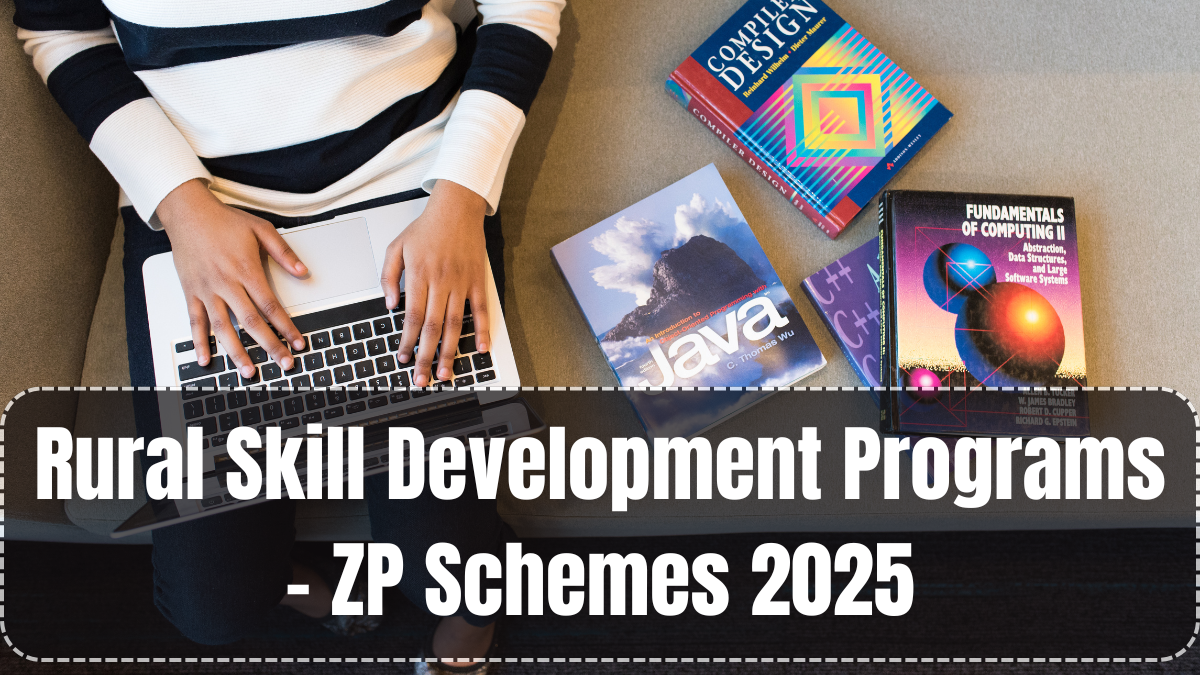In 2025, the focus on rural upliftment is stronger than ever, and Rural Skill Development Schemes launched by Zilla Parishads (ZPs) are playing a central role in transforming villages into self-sustaining and economically active regions. These schemes aim to equip rural youth, women, and underprivileged groups with employable skills aligned with both local needs and national industry trends.
Gone are the days when rural employment was restricted to agriculture or MGNREGA labor. Today, digital literacy, solar panel repair, tailoring, mushroom farming, and even AI-driven data entry are part of ZP-approved skill programs — all designed to generate income, reduce migration, and build local entrepreneurship ecosystems.

Key Objectives of ZP Skill Development Programs in 2025
Zilla Parishads across India have been directed by the Ministry of Rural Development to prioritize job-ready training and self-employment in this year’s action plans. The main goals of these Rural Skill Development Schemes include:
-
Enhancing employability of youth aged 18–35 in rural areas
-
Promoting local entrepreneurship, especially among women and SC/ST communities
-
Reducing dependency on urban migration by creating village-level jobs
-
Strengthening the role of panchayats in skill identification and training implementation
-
Encouraging public-private partnerships for high-demand skill training
Categories of Skill Training Offered Under 2025 ZP Schemes
In 2025, the training modules under rural skill programs are highly diversified to meet the evolving demands of both rural and urban job markets. Common training categories include:
-
Digital & IT Skills: Computer literacy, digital banking, cyber café operations, data entry, e-commerce support
-
Agriculture & Allied: Organic farming, drip irrigation, composting, poultry, bee-keeping
-
Manufacturing & Production: Sewing machines, incense stick making, handicrafts, furniture painting
-
Green Jobs: Solar panel installation, rainwater harvesting, plastic recycling
-
Service Sector Skills: Hospitality basics, beauty and wellness, home nursing, delivery logistics
Each program runs between 30 to 90 days and includes theory, practical work, and soft skill development. Certificates are issued under schemes like DDU-GKY, PMKVY, or state-specific ZP skill missions.
Infrastructure and Implementation at the Panchayat Level
To support these schemes, dedicated Skill Development Centres (SDCs) are now being established in cluster Gram Panchayats. These centres are either built new or developed by upgrading old government schools or community halls. Each SDC is:
-
Equipped with computers, internet, solar lighting, and demo units
-
Staffed with certified trainers and local master resource persons
-
Connected to job placement cells that maintain ties with local industries
-
Monitored via apps and dashboards under e-Gram SkillTrack 2025
Some states like Maharashtra, Tamil Nadu, and Rajasthan have already inaugurated state-ZP joint SDCs that serve as model hubs for other regions.
Women-Centric Skill Development Schemes
One of the standout features of the Rural Skill Development Schemes this year is the increased emphasis on empowering women economically. Key programs include:
-
Tailoring & Embroidery with supply tie-ups to local garment exporters
-
Homemade Food & Pickle Units supported by marketing through SHGs
-
Beauty & Wellness Courses with salon internships
-
Entrepreneurship Literacy: Training in budgeting, digital payments, GST registration
Many Zilla Parishads now collaborate with State Livelihood Missions (SLMs) and National Rural Livelihood Mission (NRLM) to provide revolving funds, seed capital, and raw material kits to women who complete certified training.
Partnerships with Industry & NGOs
To boost employment outcomes, several ZPs have signed MoUs with companies and NGOs to run skill labs, provide internships, or offer direct hiring post-certification. Examples include:
-
Tata Strive and NSDC for technical training in rural MP
-
SEWA Bharat partnering with ZPs in Gujarat to train women-led SHGs
-
Amazon Karigar and Flipkart Samarth onboarding rural artisans for online selling
-
Maruti Suzuki’s Skill Training Program in Haryana for youth on vehicle servicing
These partnerships ensure that training is not just theoretical but connected to real work opportunities, whether it’s in manufacturing, logistics, retail, or agriculture.
Monitoring, Placement & Support After Training
Zilla Parishads are now using centralized tracking systems to measure the success of their schemes. Every candidate who completes training is entered into a Skill Employment Registry, which tracks:
-
Certification status
-
Placement outcome (employed/self-employed)
-
Income improvement metrics (pre/post training)
-
Retention and progress data
Many districts have also launched Post-Training Support Cells offering:
-
Business mentorship
-
Access to Mudra Loans and Stand-Up India
-
Exhibition participation support
-
Registration help for GST and MSME portals
FAQs
What is the focus of Rural Skill Development Schemes in 2025?
These schemes focus on training rural youth and women in job-ready skills across IT, agriculture, manufacturing, and services, with an emphasis on local employment and self-reliance.
Who is eligible for ZP skill development programs?
Anyone between 18–35 years from rural areas, especially women, SC/ST communities, school dropouts, and unemployed youth can enroll.
Are the training programs certified?
Yes. Programs are certified under national schemes like PMKVY, DDU-GKY, and are recognized by NSDC or respective state skill councils.
Do participants get jobs after training?
Yes. Many ZPs offer placement assistance, startup support, and tie-ups with industries and e-commerce platforms for job opportunities.
How are women benefiting from these schemes?
Women are being trained in tailoring, food production, wellness services, and digital marketing, with access to funding and mentorship for launching micro-enterprises.
Click here to know more.
